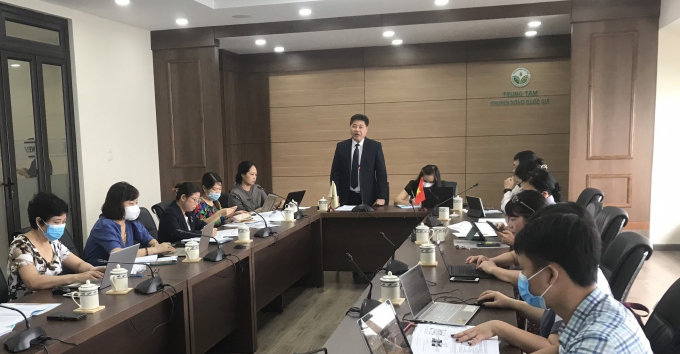November 26, 2025 | 12:52 GMT +7
November 26, 2025 | 12:52 GMT +7
Hotline: 0913.378.918
November 26, 2025 | 12:52 GMT +7
Hotline: 0913.378.918

Le Quoc Thanh, Director of the National Agricultural Extension Center (MARD) delivers a speech at the workshop.
The workshop was conducted on-site and online to complete the papers with guidelines for gender mainstreaming in agricultural extension for the training of trainers (ToT) within the cooperation framework of NAEC and UN Women in 2021.
The workshop gathered input from numerous representatives of NAEC departments, provincial agricultural extension centers, and related parties such as CARE, SNV, and OXFAM. These comments will serve as the foundation for the editorial team as they edit and complete the document to ensure that it meets all requirements, is of high quality, and is efficient.
Indeed, women have poorer access to input services and agricultural extension services than males in both agriculture and business. Women participate in agricultural extension activities at a somewhat lower rate than men, even though women constitute the primary labor force in agriculture, especially in the wake of men's migration out of rural regions and the agricultural sector. Additionally, the reality demonstrates gender disparity in agricultural extension. On the other hand, agricultural extension programs and activities have generally fallen short of meeting the requirements of rural women. Therefore, it is urgent to pay due attention to the gender aspect of agricultural extension to improve women's access to agricultural extension activities.
Existing laws have yet to provide explicit guidance on how to integrate gender into agricultural extension operations. Agricultural extension policies are primarily concerned with increasing agricultural extension services such as value chain linkage and technology transfer, without paying much attention to gender mainstreaming. This constraint results in the formation of gender barriers, denying women equal opportunity to benefit from sharing with males and, in particular, restricting women's ability for business activities.
For the reasons stated before, it is critical to develop a document outlining rules for gender mainstreaming in agricultural extension for local-level officials and to communicate about gender mainstreaming in agricultural extension.
Le Quoc Thanh, Director of the National Agricultural Extension Center (MARD), said that mainstreaming gender issues into agricultural extension operations would result in increased agricultural output efficiency. To help achieve this goal, the center collaborated with UN Women to create a set of documents on gender mainstreaming in education and plans to ensure that gender work is integrated into all agricultural extension activities, including model building, training and education, information and propaganda, and conference and seminar work.
“During the document's early stages of development, the center collaborated with UN Women and also asked the Women's Union, Farmers' Union, and other public groups to join forces in gender work. Following the creation of the document, the center will collaborate with industry organizations to organize conferences, seminars, and experimental teaching sessions to provide direct answers to extremely prevalent problems, with an emphasis on local outreach. Not only the agricultural extension center but also foreign and local organizations will engage in a synchronized way via this technique," Thanh said.

(VAN) Thanh Hoa province has substantial potential to supply carbon credits, opening opportunities for green economic development, enhancing agriculture and forestry value.
/2025/11/25/1741-0-nongnghiep-221736.jpg)
(VAN) The application of AI helps identify emission sources and assess air pollution developments, thereby supporting management agencies in issuing timely and appropriate control policies.

(VAN) Viet Nam will develop its carbon market not only by prioritizing transaction volumes but also by transitioning to a low-emission economy.
/2025/11/25/3413-1-171953_261.jpg)
(VAN) Experts from the Vietnam Academy of Science and Technology have conducted surveys to identify the causes of landslides in Lam Dong province and propose natural disaster prevention solutions.

(VAN) The HNT reservoir operation support system, developed by WeatherPlus in collaboration with Kyushu Electric Power, enables real-time rainfall forecasting, inflow forecasting, and flood-release simulations.

(VAN) Dr. Cao Duc Phat stated that the localization of early natural disaster warning technologies will help meet practical requirements and create favorable conditions for domestic research institutions and businesses to develop.

(VAN) In addition to improving early-warning technologies, there is a need for software that can guide response actions, track community evacuations, and manage safe zones through digital mapping.